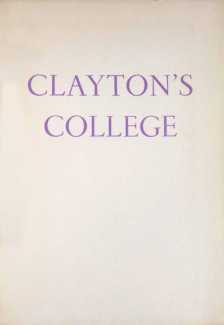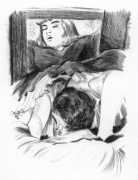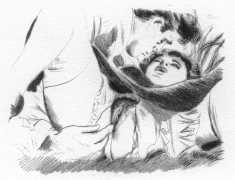 Following the commission for a new edition of Nous deux a year earlier, Saint-Croix was commissioned to produce a similar set of drypoints for a new edition of the erotic thriller Clayton’s College. Realistic and delicate, they are a convincing foil to the accomplished text.
Following the commission for a new edition of Nous deux a year earlier, Saint-Croix was commissioned to produce a similar set of drypoints for a new edition of the erotic thriller Clayton’s College. Realistic and delicate, they are a convincing foil to the accomplished text.
Clayton’s College, which when it was first published in 1948 was marketed as a translation from an American original – it isn’t – remained banned for years following a long legal battle. The first ‘legal’ version appeared only in 1969, since when it has regularly been reprinted. A rare and well-written combination of crime fiction and erotica, Clayton’s College set a standard for many novels in a similar vein.
It’s the beginning of July, and that’s when, in the American college town of Clayton-Davila, thunderstorms are most frequent. Clayton Girls’ College is almost deserted, as is Davila Boys’ College, right next door. At Clayton the only residents are the manager, Mr Boni, his wife, Job the handyman, two housekeepers, and two boarders – the lovely Brenda Fleming and the endearing Conception. At Davila the most important remaining occupant is the young and handsome Joël Lincoln. Everything is ready for the storm to break out …
The author of Clayton’s College is given as ‘Connie O’Hara’, which is one of the many pseudonyms of the Belgian novelist and dramatist José-André Lacour (1919–2005), who also wrote under the names Benjamin Rochefort, Sarah Lee, Johnny Sopper and Henry Langon. Lacour grew up in Gilly, a suburb of Charleroi, and after studying at the University of Brussels published his first novel, Panique en Occident (on the theme of the German occupation of Belgium) in 1949. In 1954, continuing in the same vein as Clayton’s College, he published the detective novel La mort en ce jardin (Death in Our Garden), adapted for the cinema under the same title in 1956 by Luis Buñuel. He was married to the equally-successful Gerty Colin, a journalist who wrote biographies of Maurice Chevalier and Jean Gabin. Lacour’s grandson is the writer and publisher José-Louis Bocquet.
This edition of Clayton’s College was published by Éditions de l’Orchidée in a limited numbered edition of 325 copies.
There have been two English translations of Clayton’s College, in 1968 and 1998, the most recent in an Erotic Print Society edition, translated by Valerie Orpen, to accompany a reprint of the Sainte-Croix portfolio. A numbered limited edition of 2,500 copies, it has long been out of print.



















